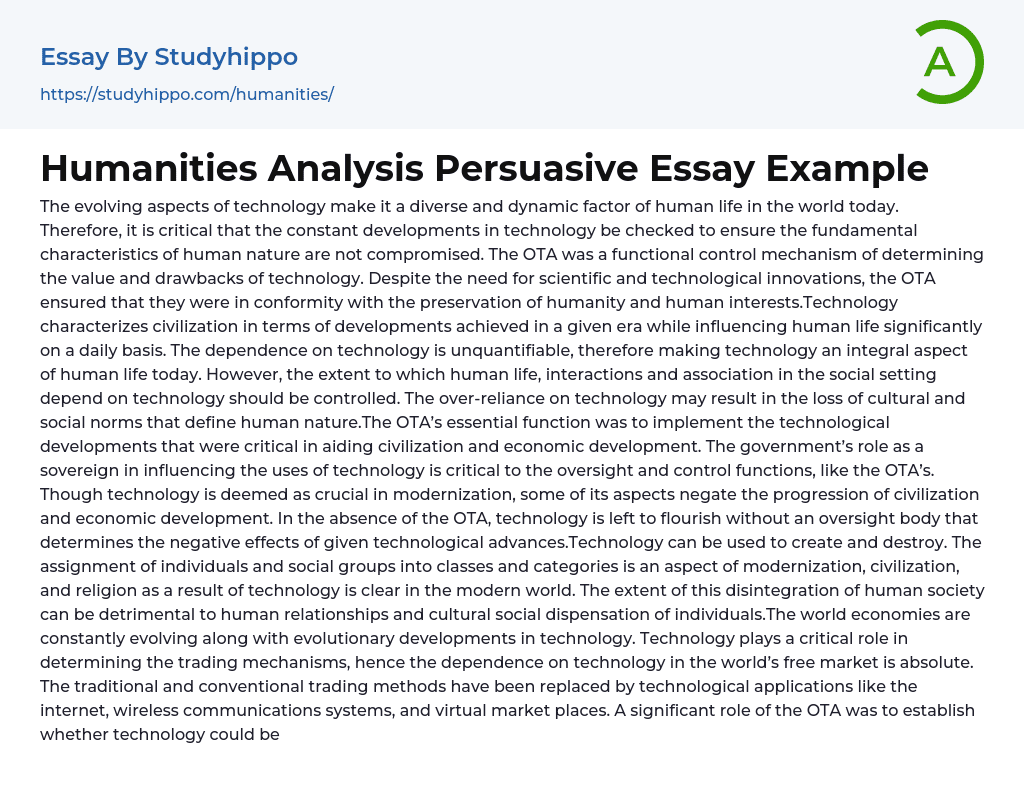Technology's ever-evolving nature has a diverse and dynamic role in today's human life. It is crucial to ensure that continuous technological advancements do not compromise fundamental human characteristics. The OTA effectively served as a control mechanism for evaluating technology's value and drawbacks, ensuring alignment with the preservation of humanity and human interests. Technology defines civilization by showcasing developments of each era and significantly impacting daily life. Its immeasurable reliance solidifies its integral role in society today. However, measures should be in place to control the extent to which human life, interactions, and social connections depend on technology. Excessive dependence may lead to the loss of cultural and social norms shaping human nature. The OTA primarily implemented vital technological advancements aiding civilization and economic growth.
The government, as a sovereign entity, plays a crucial role in influencing the use of technology, simila
r to the oversight and control functions carried out by the OTA. Despite its importance for modernization, certain aspects of technology hinder civilization's progress and economic development. In the absence of the OTA, technology grows and impacts without restriction or oversight. Technology both creates and destroys. Modernization, civilization, and technology's influence on religion result in categorizing and classifying individuals and social groups. This can have negative effects on human relationships and cultural significance. The world's economies and technology constantly evolve together. Technology is vital for determining trading mechanisms, making it essential for the global free market. Traditional trading methods have been replaced by technological applications like internet, wireless communications, and virtual marketplaces. One significant function of the OTA was evaluating whether technology could facilitate illegal or harmful trade that could lead to destruction. The OTA also
analyzed technological misuse while assessing control measures before implementation. These factors emphasize why an organization similar to the OTA is necessary to exist.
The ongoing conflict and controversy surrounding human existence, origins, and religious correctness in the modern era is influenced by individual perspectives, beliefs, religious affiliations, and sense of spiritual and philosophical isolation. This division has led to a distinction between fundamentalists and liberals in their subscribed doctrines. Liberals prioritize tolerance for alternative schools of thought, doctrines, and spiritual beliefs, interpreting them in ways that align with their perspectives. On the other hand, fundamentalists strictly adhere to their own doctrine or scripture without considering others'. Christian fundamentalists view the Bible as infallible while Islamic fundamentalism emphasizes God's supremacy over self-interests or social/political affiliations. Islam seeks to transform human nature to align perfectly with God's desires through jihad, opposing any attempt to sway believers from fundamentalist beliefs. Despite variations in scripture and teachings, both Islam and Christianity believe in the power and divinity of God as the creator of all life and everything in existence.The idea of creation, which is debated by those who support evolution and Darwinism, attributes the existence of everything to God. As a result, core beliefs aim to align followers with God's will and purpose. Islam and Christianity, both originating from the Middle East, have had distinct impacts on the world. Radical Islam has become associated with terrorist groups that operate under the banner of jihad. Religious fundamentalism has influenced global events as each religion strives to establish itself as the true faith.
In today's world, there are ongoing political, economic, and social transformations. Historical records show notable differences in leadership styles and
trade relationships among nations. However, these disparities have evolved towards a common goal of modernization leading to globalization. The world is progressively becoming more like a united village; however, conflicts arising from economic and political inequalities occasionally disrupt this unity.
Despite these challenges, these relationships have resulted in numerous benefits that demonstrate the advantages of global cooperation. Although some view globalization as an economic invasion and political dictatorship, it has proven essential for advancements in technology and social progress. The establishment of free trade markets and economic alliances between countries has significantly boosted their economic growth.Political affiliations and alliances across continents have allowed nations to safeguard their resources and collectively negotiate for political progress. However, there are individuals who oppose globalization because they perceive it as an effort to control members of global units, coalitions, and associations. Technological advancements have made globalization a reality in our daily lives. The use of interactive communication and information systems enables more efficient business transactions with instant high-speed communication at lower costs. Both the world's economies and political systems rely heavily on technology for day-to-day operations. As a result, globalization has made it possible to achieve goals that previously required significant resources and time. The ability to access information globally anytime, anywhere has greatly enhanced the efficiency and effectiveness of global systems. Moreover, technology is constantly evolving and shaping our everyday activities and interactions with others. Social media platforms, online markets, and research databases have brought about a significant transformation in traditional platforms for progress and development.Rather than being feared or distrusted, globalization should be embraced as a crucial catalyst for advancement in various areas of contemporary society such as
politics,economics,and social development
- Quran essays
- Al-Qaeda essays
- Muhammad essays
- Muslim essays
- Ali essays
- Ramadan essays
- Belief essays
- Deontology essays
- Ethical dilemma essays
- Moral essays
- Normative Ethics essays
- Values of Life essays
- Virtue essays
- Virtue Ethics essays
- Work Ethic essays
- Afterlife essays
- Atheism essays
- Bible essays
- Buddhism essays
- Christian Worldview essays
- Christianity essays
- Confession essays
- Cosmological Argument essays
- Deism essays
- Devil essays
- Existence of God essays
- Faith essays
- Freedom Of Religion essays
- God essays
- Hinduism essays
- Immortality essays
- Islam essays
- Jainism essays
- Jews essays
- Judaism essays
- Miracle essays
- Monk essays
- Monotheism essays
- New Testament essays
- Old Testament essays
- Pilgrimage essays
- Puritans essays
- Revelation essays
- Ritual essays
- Salvation essays
- Sin essays
- Sinners essays
- Soul essays
- Taoism essays
- Temple essays




